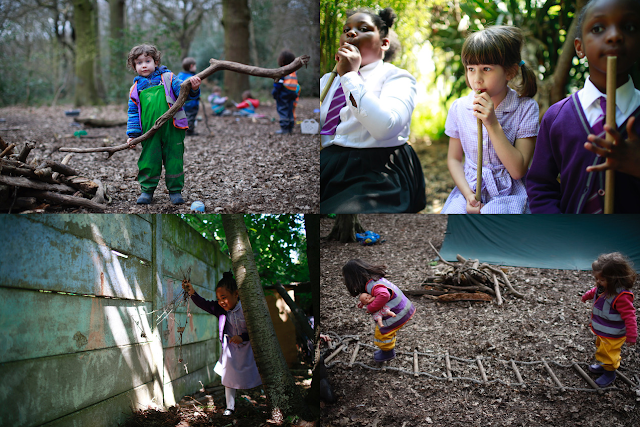 |
| Children at Into the Woods nursery and Ark Franklin Primary Academy/Credit: Caroline Irby |
“Nature
breeds curiosity; it helps grow explorers rather than robots.” Ben
Palmer-Fry, outdoor learning teacher, Ark Franklin Primary Academy.
Children in the UK spend
less time outside than high-security prisoners, according to a recent report.
While their grandparents roamed
unsupervised outdoors, our children spend their days cooped up inside, glued to
a screen. We have displaced nature from
their lives: selling off their outdoors spaces, feeding them technology,
keeping them inside with our fears and lack of time.
A few years
ago, the National Trust published a report on the phenomenon of "nature
deficit disorder", a term coined in 2005 by the American author Richard Louv, who argued that the human cost of "alienation from nature" was
measured in "diminished use of the senses, attention difficulties and
higher rates of physical and emotional illnesses".
Nature deficit
disorder is not generally regarded as a medical condition. Yet, in the UK as in
many other countries, rates of obesity, self-harm and mental health disorders
diagnosed in children have climbed significantly since the 1970s.
What if
we could ‘rewild’ their childhood - bring back nature into their
lives? Could it produce healthier and happier young people?
Many
people believe so, and a growing number of schools across the country (and
elsewhere) are trying to do just that: they are re-introducing nature into
children’s lives. It is seen as a new trend, but the UK has a rich
heritage of outdoor learning going back at least to the 19th century with
Wordsworth, Ruskin, Baden and many others.
Some schools
are following the Forest School philosophy, drawing on the Scandinavian model
of Nature Kindergartens, while others are developing their own outdoor learning
organically, adapting it into their curriculum.
Many community programmes, projects and social enterprises are also
trying to reconnect young people with nature.
And the
results are amazing. A solid body of research show the significant health,
social and emotional benefits of outdoor learning. Forest School teachers say
their children are healthier, more independent, confident, creative, socially
minded and caring for the environment than other children. Yet, outdoor learning
is likely to remain on the margins of education until the benefits are
recognised by policymakers and reflected in policies.
Photographer Caroline Irby and I have visited two London schools,
which represent two different approaches to outdoor learning. Into the Woods, a nursery where children spend their entire days in the woods, rain or
shine, and Ark Franklin Primary Academy, which has transformed a piece of urban derelict
land into a green oasis with a storytelling grove, a bug
hotel, a vegetable garden and more. The outdoors lessons include
sciences, literacy and maths, but also “weaving and knot-tying and everything
we think will be useful,” says headteacher Janine Ryan.
“Education
is increasingly dominated by academic targets and a narrow curriculum,” says
Emma Shaw, founder and manager of Into the Woods, London’s first Forest School
nursery. “The concept of play is lost along the way. ‘Let’s do the Maths
earlier’: everything is measured. We all live our lives on screen all the
time… Here, the children can be themselves. They have space and time to
explore, learn and do their own things.”
You can
read our story “Learning Outdoors: Growing Explorers, not Robots” published in Positive News.
No comments:
Post a Comment